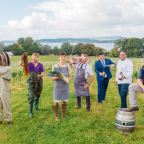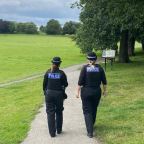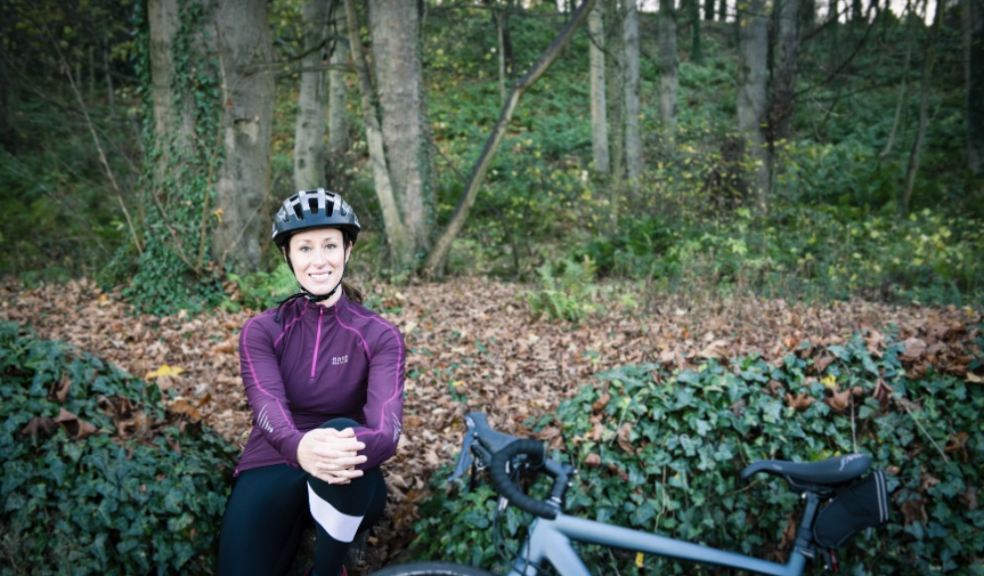
Beer to Soberton: A Road Less Travelled
It’s the 16th of September 2016, and I’ve just made a decision that will alter the trajectory of my life in ways that I can’t possibly fathom right now. I’ve decided to give up drinking. I had a feeling it might come to this, and believe me, I’ve done my best to avoid it. After all, what thirty-two-year-old wilfully chooses a life of abject boredom and eternal FOMO. Life without booze was death, and I couldn’t get my head around it.
I’d been negotiating with a compulsion for chaos since my late teens. “You’re not that bad”, “Other people get wasted too,” and “You’re allowed to have fun, for goodness sake” were the usual excuses in my internal repertoire. Deep down I knew that there’s no reasoning with addiction. The implications of my partying and dubious decision-making had taken on a sinister flavour in recent years. I had future visions of myself doing all-nighters and gate-crashing student parties while other women my age were cooing over grandchildren.
My drive to survive had become more important than any perceived notion of a boring, sober life. It had to stop. And so, there I was, open and willing to give this sobriety thing a go, albeit utterly petrified.
I was living in South Korea at the time, which was both a blessing and a curse in many ways. Drinking to oblivion is a socially accepted phenomenon in East Asia’s rapidly developing country, especially as an expat. There were few evening occasions that didn’t involve heavy drinking, and if it’s a work celebration, don’t even think about declining the obligatory rounds of Soju shots, Korea’s version of vodka.
This meant that for a period of about six months, I avoided evening social gatherings except for the odd dinner with non-drinking friends, which were about as common as sabre-tooth tigers. Instead, I indulged in some obsessive reading about the history of Korea, and more specifically, the topic of North Korea.
I lived about thirty kilometres from the DMZ (Demilitarized Zone), a stretch of uninhabited land strewn with landmines that separates North and South Korea. I used to visit the DMZ and peer through powerful binoculars, revealing real-life North Koreans walking around or riding their bikes. There were no more than a couple of miles between us, yet in many ways, we were worlds apart. There are few words to describe how surreal it felt.
Not long after getting sober, I bought a second-hand hybrid bike for about £150, which I planned to use to commute to work. Not having owned a bike since childhood, I had forgotten how exhilarating it felt to be whizzing along at lightning speed, immersed in the elements.
It was August and I had a week-long holiday coming up, so I decided to take my rekindled love affair with cycling to the next level and cycle along the East coast of South Korea. Most importantly, I would explore the area around the North Korean border on the East Coast – an area seldom featured in the guidebooks.
“Choose your country, use guidebooks to identify the areas most frequented by foreigners, then go in the opposite direction” - Dervla Murphy

I’ve always had an insatiable curiosity for lesser-known people and places. Growing up in Northern Ireland during the Troubles, I was keen to get the heck out of there. Following a solo trip to Spain as a teenager as part of an exchange program, I felt sufficiently confident to spread my wings further. Plus, I have a natural flair for languages, so adapting to my surroundings came relatively easy to me.
I vividly remember the first exquisite taste of freedom on that Spanish trip as I boarded an overnight coach bound for Madrid. A riotous tangerine horizon straddled the vast Northern Spanish plains, captured by the dream-like sounds of Moby in my earphones. At that moment, I wondered if I could ever be satisfied with a “normal life”.
As a Westerner, the ability to head off into the unknown with no place to be and nothing to do but engage with each unfolding minute is one of life’s most precious gifts.
Not long after my 18th birthday, I travelled to Argentina on a year-long volunteering program, an adventure that started off with well-meaning intentions. Things turned sour, however, and my benevolent exploration of South America’s vibrant metropolis, Buenos Aires, turned into a cocaine-fuelled prodigal bender of gargantuan proportions.
I spent my twenties on an existential rampage through the jungles of life, pushing my limits to the utmost edge while maintaining a faint sense of self-preservation. I was barely keeping my head above water yet simultaneously giving the swift middle finger to societal expectations and any notion of grown-up decision-making.
It was drug and alcohol-fuelled pandemonium in the name of adventure, and it came at a heavy price. I would spend time in the UK working a random unfulfilling job, save some money, then head off on an adventure to some far-flung destination. The edgier the country, the better. I almost always returned home early having spent all my money, no longer able to manage my mental health which invariably took a nosedive thanks to my reckless partying antics. Heaven knows how I survived.
When the opportunity to travel to South Korea arose, I snubbed the idea due to the lack of readily available recreational drugs there. Eventually, I surmised that despite my concerns, South Korea offered a bounty of interesting and fulfilling experiences, so I bit the bullet and booked a flight.
Now, here I am, barely a year sober in South Korea and about to head off on an adventure of a whole different kind. My plan was to take a tent and a few basic supplies. I had no proper cycling gear, and my navigation system consisted of a Korean app called Naver (Google Maps doesn’t work well in Korea). Thankfully, I spoke intermediate-level Korean by then, which meant I could read the main functions of the app, but mostly, I asked locals for directions.
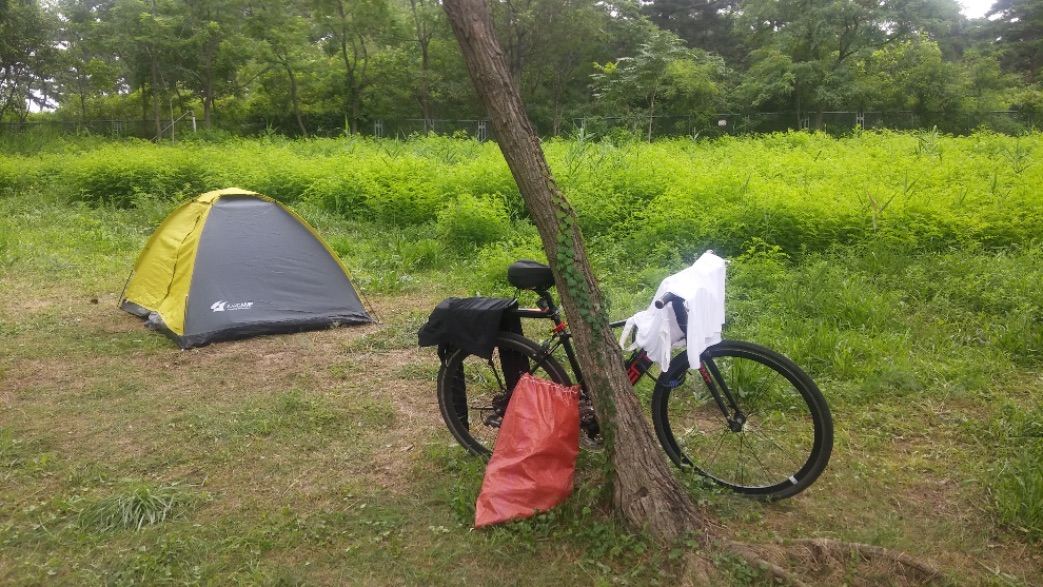
During a last-minute trip to the bike shop before setting off, I asked the mechanic if the East Coast was a tough route and confirmed that it was, indeed, very challenging. “Sod it”, I thought. “What’s the worst that could happen?”.
Heat stroke. That’s the worst that could happen, as I would soon find out as I set off in the infamous Korean summer humidity. Looking back, I’m surprised at my lack of planning for the trip, but ultimately, I’ve chalked that down to inexperience. One thing is for sure, I’ve never let inexperience get in the way of trying something new.
As I settled into a rhythm of unforgiving climbs, gravity-defying descents and mellow coastal flats, I was better able to absorb my surroundings and revel in the spontaneity of my bike-packing trip.
Every morning, I would wake in my tent or, on occasion, a love motel – due to lack of a better option, buzzing at the prospect of not knowing what the day would hold. I stumbled upon sleepy fishing villages untouched by South Korea’s obsession with modernity. I slurped fresh chilli-infused seafood soups and chatted with villagers, struggling to understand their local accents.
Most rural Koreans are usually taken aback when they come face to face with a Korean-speaking foreigner. I’ve always found learning the language an invaluable and necessary part of off-the-beaten-track travelling. It goes without saying that there is no better way to really get to know a country and its people. Most importantly, locals generally warm to foreigners who speak a few words of their language. As a woman prone to travelling off piste, this has become one of my most indispensable survival strategies, bar making myself look as plain as possible.
On day three of my trip, I found myself cycling through a rice paddy surrounded by the tired, hypnotic sound of tall, swaying rice grass. Suddenly, to my right, no more than 100 meters away, a fighter jet took off on a parallel runway. The deafening roar of the powerful engines reverberated through every cell in my body. It felt like a scene out of Top Gun! I was ecstatic. It was at that moment that I realised that I didn’t want my old life back. My eyes had been opened to a whole new visceral way of travel; sober travel. I was hooked.
As I neared the North Korean border, the military presence intensified. The regions close to the border undergo heavy surveillance in case of attack from the north or infiltration by sea. Huge concrete anti-tank barriers 30 ft tall sat upright at the side of the road, ready to be manoeuvred into place should the north attack. A couple of times, I was taken by surprise, almost losing control of my bike when shots were fired close by during military drills.
One afternoon, I had the pleasure of stumbling across a North Korean submarine that had been intercepted and brought on shore, now open to curious travellers.

The highlight of my trip was Hwajinpo Beach—a breath-taking white sandy cove flanked by a vast serene lake that emitted an orchestra of unfamiliar and exotic sounds after dusk. At the south end of the beach stood a steep, richly forested hill, characteristic of East Asia and reminiscent of the scenery in the movie Jurassic Park. Upon hiking up the hill one day for some forest bathing, I discovered Kim Jong Il’s (the father of North Korea’s current leader, Kim Jong Un) childhood holiday home. “What are the chances?” I thought. The house had been turned into a rudimentary museum, open to tourists, but there were few people around.
I didn’t encounter any crowds of expats in Hwajinpo and I was happy about that. Instead, most expats and Koreans gravitated towards the usual coastal hotspots and historical cities, some of which of course were interesting. Generally speaking, South Koreans love a trend. They love to do what everyone else is doing and they most certainly never travel alone. East Asian countries are collective societies where people stick together. They think together and they act together. Deviating from the norm is not the done thing. Any talk of solo travel is met with a mix of confusion any pity, the assumption being that you are a friendless weirdo. And, I get it. Why would you travel alone when you could travel with a bunch of friends?
Personally, I’ve always enjoyed the flexibility of travelling alone and find that it’s more conducive to getting to know locals. That said, I have at times wished I had a familiar face or loved one to share the experiences with.
On my last night in Hwajinpo, I ventured out onto the beach at around 5am, no longer able to tolerate the temperatures inside my nylon nightmare of a tent. As I buried myself in my sleeping bag, I heard a faint whizzing sound above my head. It was a drone. I was being watched by a military drone. Conscious of the threat of North Korean infiltration by sea, the South Korean military keeps a tight rein on any suspicious activity in the border regions. Shortly afterwards, I was approached by a plain-clothed Korean man in his fifties asking what I was doing there. I told him I came on to the beach to escape the heat of my tent, an explanation which he seemed satisfied with.
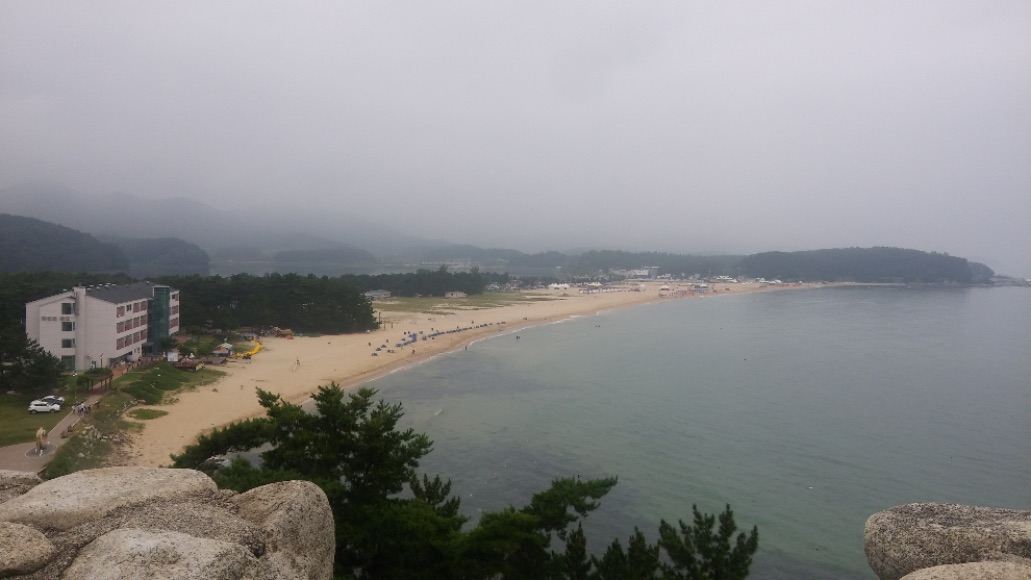
Hwajinpo Beach.
As my trip came to an end and I headed back to the bright lights and nonstop commotion of Seoul, I felt a profound sense of pride and satisfaction. Before getting sober, I could never have imagined owning a bike, never mind a cycling adventure along the coast of South Korea.
My bike-packing trip ignited a passion for sober adventure travel and planted the seed for future adventures. Travelling without booze offered a full sensory experience, one without hangovers, regret, lost belongings, and my dignity remained intact. After leaving South Korea, I planned an ambitious world trip during where I galloped across the Mongolian Steppe on horseback, swam with sharks in Oman, and backpacked in Siberia.
After arriving in Europe, I moved to a charming mountain-top town called Ronda in Spain where I created, We Love Lucid, one of the first-ever alcohol-free group travel companies. This way, I could combine my love of travel and sobriety by sharing life-affirming experiences with other sober people.

We Love Lucid Trip to Tarifa.
The Covid pandemic came and went, during which time I gave birth to my beautiful daughter, Safi, in the UK. Of course, by then I was very much out of my usual milieu of novelty and unabated adventure. Parenthood has a particularly grounding effect in more ways than one. Single parenthood offered a whole host of additional challenges, plus it would be a few years until I could go on adventures with my daughter.
Compounded by the dark Scottish winters and the prospect of a life of unfulfilled dreams, I sunk into a stifling depression.
Triggered by a moment of unwavering self-belief, courage appears out of nowhere like a tidal wave, gently signalling for me to ride it to shore. “Yes!” I say as I grasp the opportunity as if my life depended on it.
As time passed and my single parenting journey became easier, glimmers of hope started to appear on the horizon, one of which came in the form of a telephone call last October from Sober Youtuber Bat Country. I was blown away by the synchronicities in our travel stories, so I suggested that we organise a sober challenge together. He suggested that we cycle 120 miles from Beer in Devon to Soberton in Hampshire. I couldn’t believe that these two places actually existed. It was genius!
I got to work putting together and launching the trip while wondering how the heck I was going to cycle 120 miles in one day. The longest I’d ever cycled was 30 miles, and I didn’t even own a bike. After some research, I settled on a gravel bike, which I could pay off in monthly instalments. I bought some basic second-hand gear on Vinted and started training. The event would take place in May 2025, so I had seven months to prepare, or so I thought.
It turns out that cycling in winter in Scotland is virtually impossible. This winter was especially wet and especially cold which meant there were whole months where I barely got out at all. Coupled with the fact that I didn’t have the budget for a professional bike fit which caused a whole host of bodily pains and niggles.
Eventually, I got a recommendation for a brilliant bike fitter called John in Arbroath, Scotland, who offered to do the bike fit within my budget. It was night and day. No more debilitating leg pain, no more numb hands, and a burgeoning British springtime enticing me into the Scottish hills for some gruelling Beer to Soberton preparation.
The route begins in Beer with some unrelenting climbs before traversing the salty aired coastal towns of Dorset. We’ll then head inland through the sprawling New Forest before arriving at our destination in Soberton. Beer to Soberton is ultimately a monumental celebration of sobriety, the peaks and troughs of the challenging terrain symbolic of the sober journey. Six of us, hailing from all four corners of the UK, will attempt to complete the route or at least a portion of it, each participant with their own personal motivation for taking part.
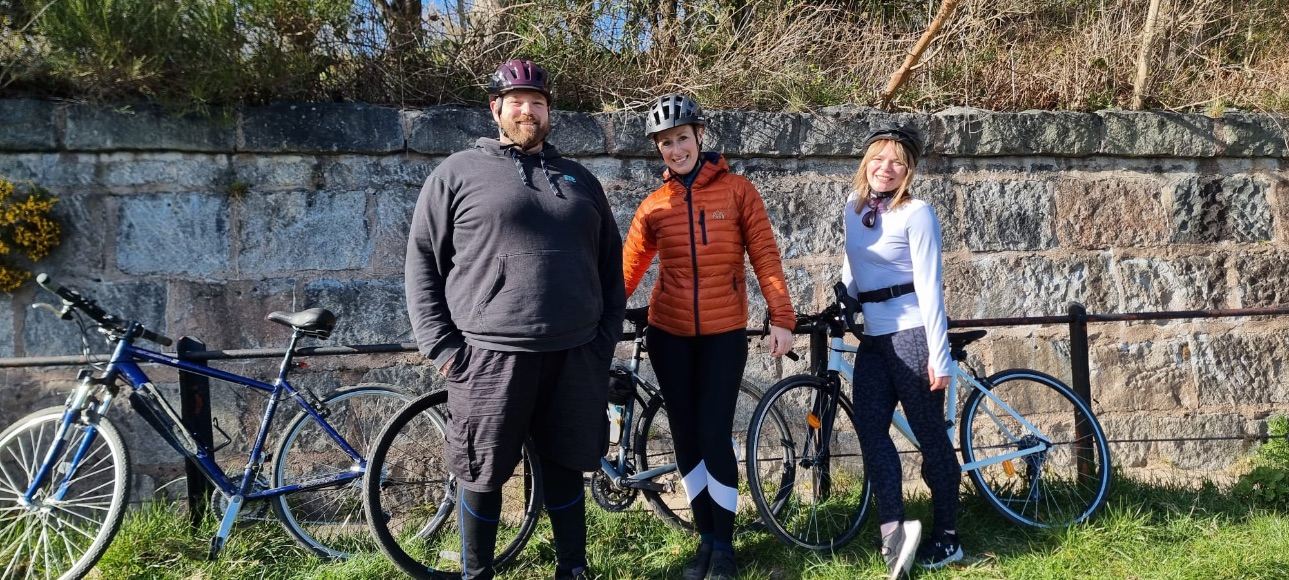
The Scottish contingent of the Beer to Soberton crew.
As Beer to Soberton draws nearer and the days get lighter and longer, I sense the beginning of a new, more hopeful phase of adventure for myself and my daughter. I feel compelled to take stock of how far I’ve come since those early days of sobriety almost nine years ago, grateful for the second chance at life that I’ve been given.
Life has a funny way making sure you have what you need, just when you need it. Getting out on my bike under the boundless open sky has saved me in ways too profound to comprehend. For now, the South West is calling.
Only those who risk going too far can possibly find out how far they can go - T.S. Elliot.
By Lauren Burnison
You can read more about Lauren’s journey here and you can follow the Beer to Soberton challenge on Instagram @welovelucid

















